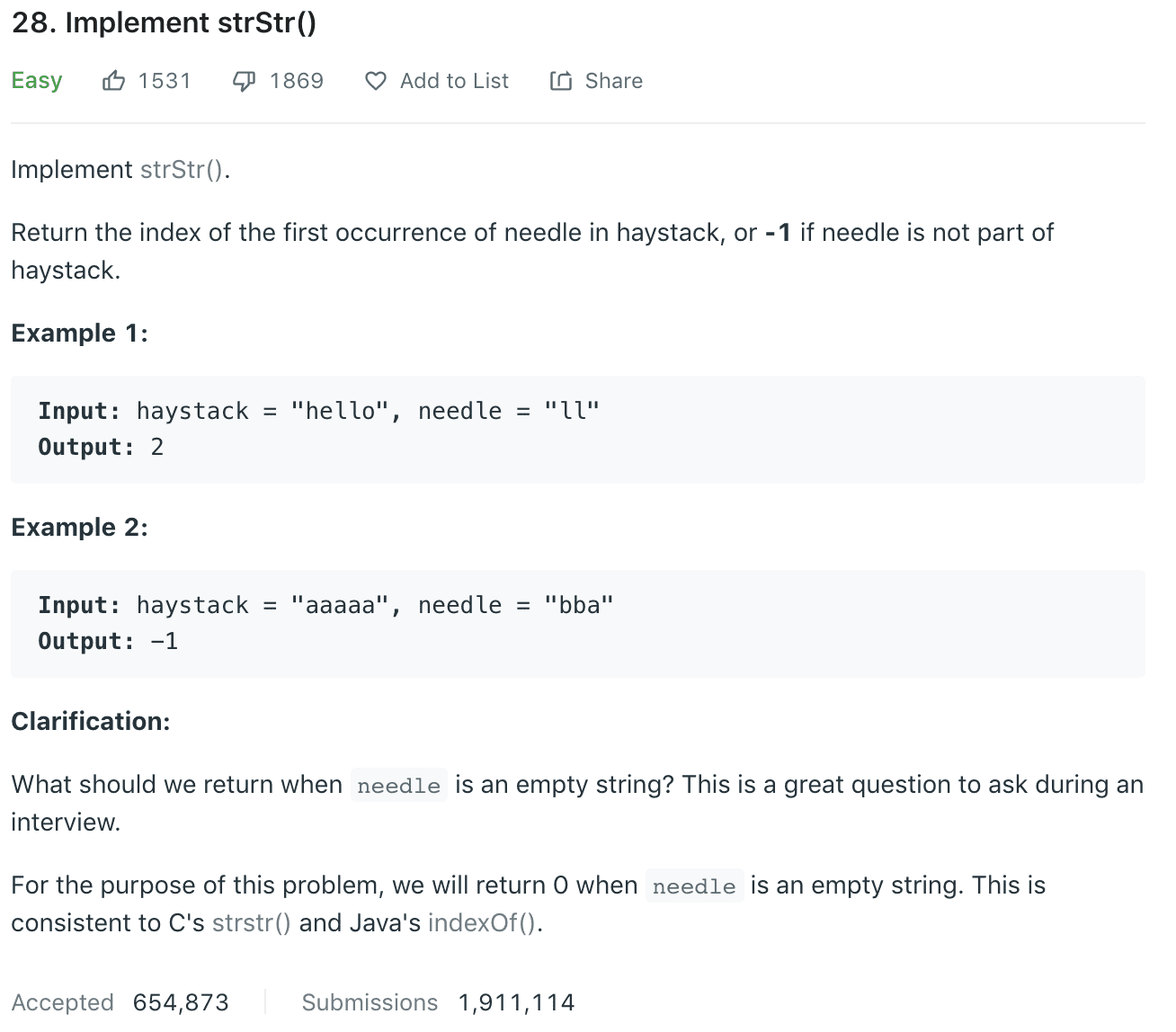Approach 1: Substring: Linear Time Slice1
2
3
4
5
6
7
8
9class Solution {
public int strStr(String haystack, String needle) {
int l=needle.length(),n=haystack.length();
for(int i=0;i<n-l+1;i++){
if(haystack.substring(i,i+l).equals(needle)) return i;
}
return -1;
}
}
Approach 2: Two Pointers: Linear Time Slice link1
2
3
4
5
6
7
8
9
10
11
12class Solution {
public int strStr(String haystack, String needle) {
int l=needle.length(),n=haystack.length();
if(l==0) return 0;
for(int i=0;i<n-l+1;i++){
for(int j=0;j<l&&haystack.charAt(i+j)==needle.charAt(j);j++){
if(j==l-1) return i;
}
}
return -1;
}
}
Approach 3: Rabin Karp (rolling hash): Constant Time Slice, Time complexity: O(N) youtube1
2
3
4
5
6
7
8
9
10
11
12
13
14
15
16
17
18
19
20
21
22
23
24
25
26
27
28
29
30
31
32
33
34
35
36
37
38
39
40
41class Solution {
private boolean isMatch(String a,String b,int start){
for(int i=0;i<b.length();i++){
if(a.charAt(i+start)!=b.charAt(i)) return false;
}
return true;
}
// function to convert character to integer
public int charToInt(int idx, String s) {
return (int) s.charAt(idx) - (int) 'a';
}
public int strStr(String haystack, String needle) {
int n = haystack.length(),l = needle.length();
if (n<l) return -1;
// base value for the rolling hash function
int base = 26;
// modulus value for the rolling hash function to avoid overflow
long modulus = (long) Math.pow(2, 31);
// compute the hash of strings haystack[:l], needle[:l]
long h = 0, ref_h = 0;
for (int i = 0; i < l; ++i) {
h = (h * base + charToInt(i, haystack)) % modulus;
ref_h = (ref_h * base + charToInt(i, needle)) % modulus;
}
if (h == ref_h && isMatch(haystack, needle, 0)) return 0;
// const value to be used often : base**l % modulus
long aL = 1;
for (int i = 1; i <= l; ++i) aL = (aL * base) % modulus;
for (int start = 1; start < n - l + 1; ++start) {
// compute rolling hash in O(1) time
h = (h * base - charToInt(start - 1, haystack) * aL + charToInt(start + l - 1, haystack)) % modulus;
if (h == ref_h && isMatch(haystack, needle, start)) return start;
}
return -1;
}
}
Approach 4: KMP pattern matching, Time Complexity: O(m+n) youtube1
2
3
4
5
6
7
8
9
10
11
12
13
14
15
16
17
18
19
20
21
22
23
24
25
26
27
28
29
30
31
32
33
34class Solution {
private int[] kmpPreprocess(String pattern) {
int i = 1, j = 0;
int[] res = new int[pattern.length()];
while (i < pattern.length()) {
if (pattern.charAt(i) == pattern.charAt(j)) {
res[i] = j + 1;
i++; j++;
} else if (j > 0) {
j = res[j - 1];
} else {
res[i] = 0;
i++;
}
}
return res;
}
public int strStr(String haystack, String needle) {
if (haystack == null || needle == null || needle.length() > haystack.length()) return -1;
int[] kmp = kmpPreprocess(needle);
int i = 0, j = 0;
while (i < haystack.length() && j < needle.length()) {
if (haystack.charAt(i) == needle.charAt(j)) {
i++; j++;
} else if (j > 0) {
j = kmp[j - 1];
} else {
i++;
}
}
return j == needle.length() ? i - j : -1;
}
}
